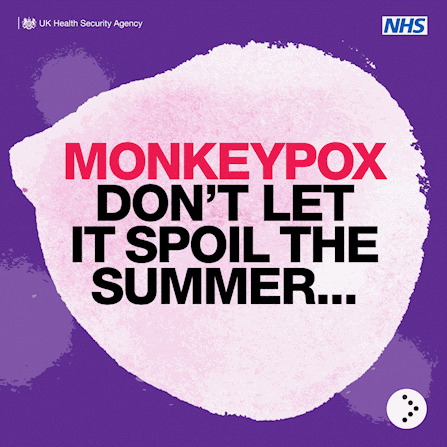Monkeypox

You may have heard about monkeypox in the news recently. But what is it, what are the symptoms and how can you access help and information?
Monkeypox is a rare infectious viral disease usually associated with travel to West Africa. It is generally a mild self-limiting illness, spread by very close contact with someone with monkeypox and most people recover within a few weeks.
Monkeypox can affect anyone. It can be passed on through close physical contact like kissing, skin-to-skin or sharing things like clothing, bedding and towels. Although more people have been diagnosed with it recently, only a small number of people in the UK have had monkeypox and the risk remains low. However we ask that people stay alert to any new rashes or lesions on any part of their body. Although this advice applies to everyone, the majority of monkeypox cases in the UK continue to be in gay, bisexual and other men who have sex with men (MSM), with the infection being passed on mainly through close contact between people in interconnected sexual networks. We therefore advise this group in particular to be aware of the symptoms, especially if they have recently had a new sexual partner.
If you have symptoms of monkeypox please phone a sexual health service or call NHS 111. You must call ahead before your visit.
- wash your hands with soap and water regularly or use an alcohol-based hand sanitiser
- only eat meat that has been cooked thoroughly
- do not go near wild or stray animals, including dead animals
- do not go near any animals that appear unwell
- do not eat or touch meat from wild animals (bush meat)
- do not share bedding or towels with people who are unwell and may have monkeypox
- do not have close contact with people who are unwell and may have monkeypox
If you test positive for monkeypox, it usually takes between five and 21 days for the first symptoms to appear. These include:
- Recent unexpected/unusual spots, ulcers or blisters anywhere on your body
- Fever
- Muscle aches
- Chills and exhaustion
- Headaches
- Swollen glands/lymph nodes
A rash can develop, often beginning on the face, then spreading to other parts of the body. The rash changes and goes through different stages – similar to chicken pox – before finally forming a scab, which later falls off.
Please contact a sexual health clinic if you have a rash with blisters and you’ve been either:
- in close contact, including sexual contact, with someone who has or might have monkeypox (even if they’ve not been tested yet) in the past 3 weeks
- to West or Central Africa in the past 3 weeks
Make sure you contact the sexual health clinic before your visit. Tell the person you speak to if you’ve had close contact with someone who has or might have monkeypox, or if you’ve recently travelled to Central or West Africa.
Do not go to a sexual health clinic without contacting them first. Stay at home and avoid close contact with other people until you’ve been told what to do.
If you are not able to contact a sexual health clinic you should call NHS 111.
For more FAQs please visit our Monkeypox FAQs page.
For more information please visit nhs.uk or gov.uk for regular updates posted by the UK Health Security Agency.
